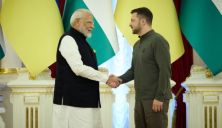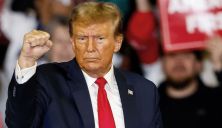Prime Minister Narendra Modi's visit to Ukraine and his meeting with the Ukrainian President Volodomyr Zelensky towards the end of August this year...
Vous n'êtes pas connecté
- English
- Français
- عربي
- Español
- Deutsch
- Português
- русский язык
- Català
- Italiano
- Nederlands, Vlaams
- Norsk
- فارسی
- বাংলা
- اردو
- Azərbaycan dili
- Bahasa Indonesia
- Հայերեն
- Ελληνικά
- Bosanski jezik
- українська мова
- Íslenska
- Türkmen, Түркмен
- Türkçe
- Shqip
- Eesti keel
- magyar
- Қазақ тілі
- Kalaallisut ; kalaallit oqaasii
- Lietuvių kalba
- Latviešu valoda
- македонски јазик
- Монгол
- Bahasa Melayu ; بهاس ملايو
- ဗမာစာ
- Slovenščina
- тоҷикӣ ; toğikī ; تاجیکی
- ไทย
- O'zbek ; Ўзбек ; أۇزبېك
- Tiếng Việt
- ភាសាខ្មែរ
- རྫོང་ཁ
- Soomaaliga ; af Soomaali
Rubriques :
 Maroc - EURASIAREVIEW.COM - A la une - 16/Jul 00:17
Maroc - EURASIAREVIEW.COM - A la une - 16/Jul 00:17
When Modi Met Moscow – Analysis
By Sumit Ganguly In a striking departure from the practice of first visiting India’s South Asian neighbours after assuming the premiership, Prime Minister Narendra Modi, after being elected for a third term, chose Moscow for his inaugural foreign visit. What explains his decision to visit Russia and bear hug Russian President Vladimir Putin even at the cost of irking the United States? One of India’s principal concerns inMoscow’s growing closeness(and dependence) on Beijing since the onset of the Russia–Ukraine war. New Delhi has watched this development with an increasing sense of foreboding because of its enduringrivalry with Beijing, which has worsened in the recent past. Consequently, it is reasonable to surmise that Modi decided to travel to Moscow to reaffirm India’s long-standing friendship with Russia, especially at a time when Russia is feeling the effects of diplomatic and economic isolation owing to Western sanctions. Whether this gesture on Modi’s part will lead to any attenuation of Moscow’s dependence on Beijing remains an open question. Beyond India’s China rivalry, there are other reasons behind New Delhi’s willingness to flout much of Western and even global opinion and continue tocourt Moscow. It is not especially well-understood in Western foreign policy circles that a degree ofCold War nostalgiapermeates a significant segment of the Indian foreign policy establishment, cutting across ideological and party lines. Consequently, lauding and reaffirming India’s long-standing ties to Russia plays well inIndia’s domestic politics. Despite the dramatic improvement in US–India relations, particularly after theUS–India nuclear accordof 2008 — which ended India’s diplomatic isolation in many arenas — a degree of residual distrust of the United States still lingers in India’s foreign policy circles. Owing to the persistence of these misgivings, policymakers in New Delhi remain unwilling to abandon their ties with Moscow. Many Indian policymakers remain convinced that maintaining the partnership with Russia enhances what they consider a talismanic guiding principle of India’s foreign policy — the concept of ‘strategic autonomy’. Namely, the avoidance of inordinate dependence on any particular partner. In this context, it is worth mentioning that despite efforts on the part of the United States and others topersuade New Delhito wholeheartedly embrace the Quad, it has remained a partial partner in that grouping. Apart from the concern about a Moscow–Beijing partnership and the Cold War legacy, there are compelling economic reasons that in all likelihood led Modi to undertake this visit to Moscow. India has been able to ward off soaring inflation at home through its purchases of Russian petroleum at lower than market prices since Moscow’s invasion of Ukraine. India is now the second largest purchaser ofRussian crude oilafter China. Given that 80 per cent of India’s petroleum needs are reliant on imports, theaccess to cheap Russian oilis easing India’s substantial domestic needs. Russian imports are also enabling India to refine the crude and sell it at market prices on the global market. European states have proven to bewilling buyersof these products. Other factors also explain this enduring entente with Moscow. Despite attempts, especially since the post-Cold War era, to diversify its sources of weapons acquisitions and develop its own defence industrial base, India remainsacutely dependenton Moscow for a range of conventional weaponry. As much as 70–85 per cent of India’s conventional arsenal is of Soviet or Russian origin. Despite somesupply disruptionsthat India has faced in the wake of the Ukraine war, it cannot afford to walk away from this arms transfer relationship. There are certain complex weapons systems, including nuclear reactors for India’s nascent nuclear submarine program and air defence missiles, that India cannot obtain from the West owing to either the costs or technology transfer constraints. Moscow’s willingness to assist India with these critical defence supplies has further cemented India–Russia ties. Modi’s visit to Moscow underscores an important source of continuity in India’sforeign policy orientation. The relationship with Russia is simply too important for Indian policymakers to abruptly jettison, especially in a global order that is fraught with uncertainty. Ethical considerations aside, the seemingly tried-and-true relationship with Russia remains a safe harbour for India. About the author: Sumit Ganguly is Distinguished Professor Emeritus of Political Science at Indiana University, Bloomington and Visiting Fellow at the Hoover Institution, Stanford University. Source: This article was published by East Asia Forum
Articles similaires
India’s Soft Power And Hopes Of Being A Peace Broker In Russia-Ukraine War – OpEd
Prime Minister Narendra Modi's visit to Ukraine and his meeting with the Ukrainian President Volodomyr Zelensky towards the end of August this year...
India’s Neutral Moves in Geopolitics will End. Interview with Oleksandr Sushko
Indian Prime Minister Narendra Modi discussed the situation in Ukraine by phone with the President of the United States, Joe Biden. He also had a...
Russia Threatens to Change Nuclear Policy Over West's Role in Ukraine
Deputy Foreign Minister Sergei Ryabkov said Sunday that Russia would revise its nuclear weapons policy in response to what he sees as a Western...
Russia Threatens to Change Nuclear Policy Over West's Role in Ukraine
Deputy Foreign Minister Sergei Ryabkov said Sunday that Russia would revise its nuclear weapons policy in response to what he sees as a Western...
Ukraine’s Complicated History With Neighbours – OpEd
A bizarre geopolitical thesis in the Indian media recently characterised Prime Minister Narendra Modi’s recent 7-hour trip to Ukraine via Poland...
Ukraine’s Complicated History With Neighbours – OpEd
A bizarre geopolitical thesis in the Indian media recently characterised Prime Minister Narendra Modi’s recent 7-hour trip to Ukraine via Poland...
Bangladesh Redefining Foreign Policy: A Strategic Shift Towards Sovereignty? – OpEd
In recent years, Bangladesh has shown a growing inclination to reduce Indian influence within its borders, signaling a significant shift in its...
US intelligence says Russia is promoting Trump ‘more subtly’ than before – WP
According to US intelligence, covert efforts by Russian authorities to influence the 2024 US presidential election are more advanced than previously...
US intelligence says Russia is promoting Trump ‘more subtly’ than before – WP
According to US intelligence, covert efforts by Russian authorities to influence the 2024 US presidential election are more advanced than previously...
Les derniers communiqués
-
Adobe Brings Conversational AI to Trillions of PDFs with the New AI Assistant in Reader and Acrobat
Adobe - 21/02/2024
-
Laura Frigenti takes the Helm as Chief Executive Officer of the Global Partnership for Education
Global Partnership for Education - 05/12/2022

